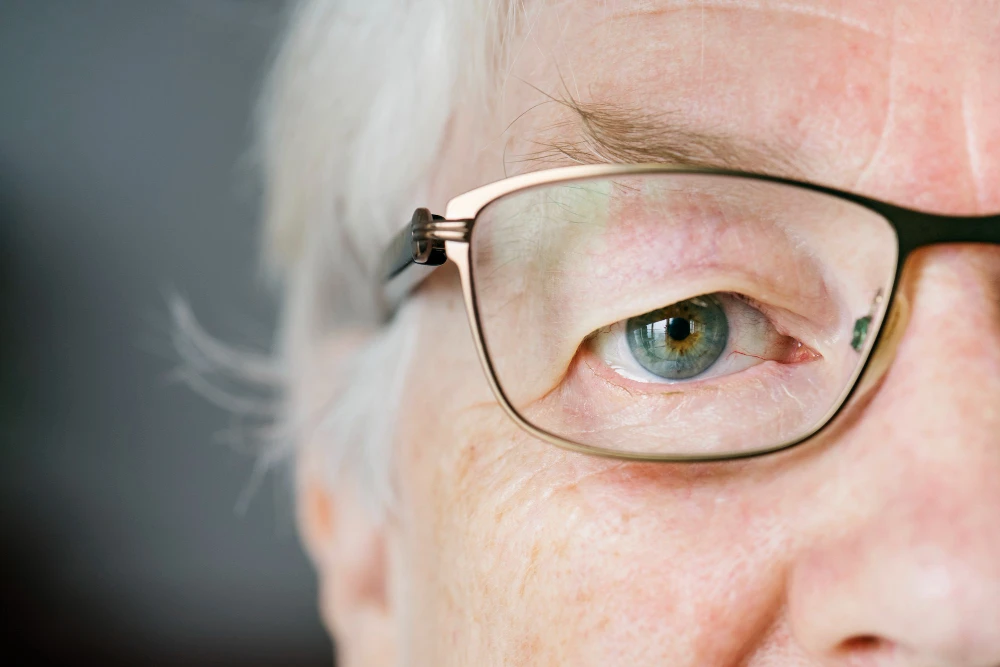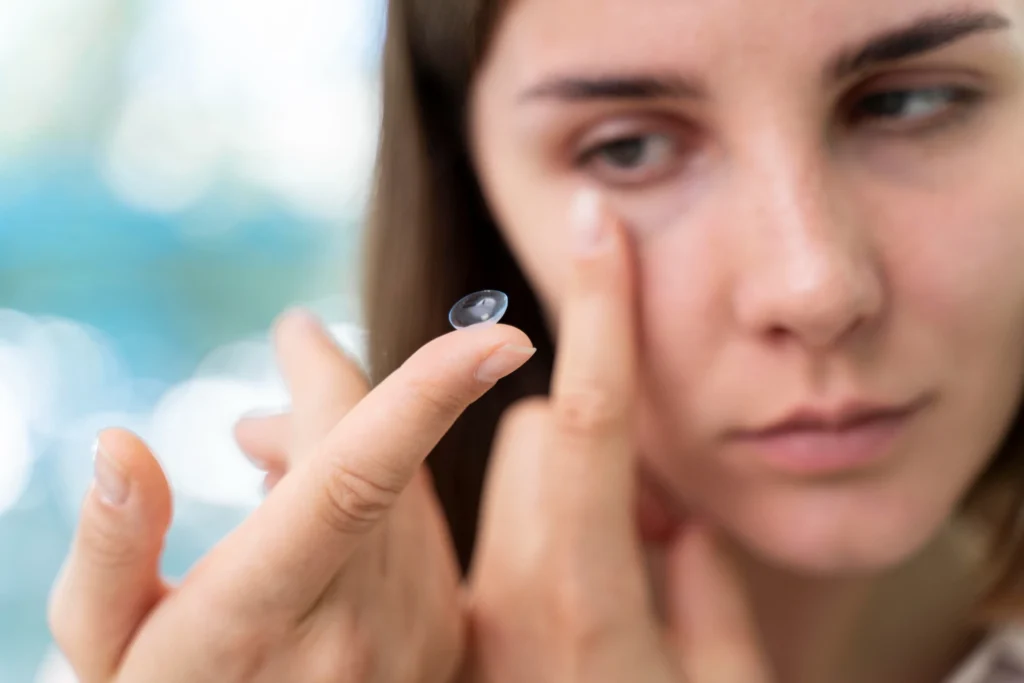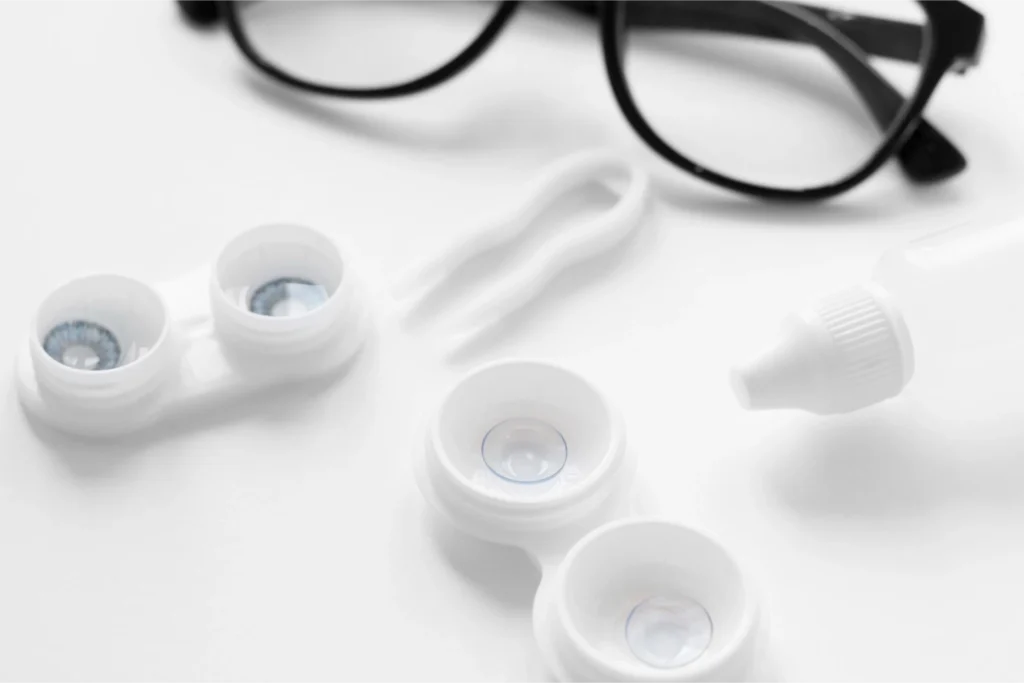Itchy eyes can be a frustrating and uncomfortable experience that many people face at some point in their lives. According to the American Academy of Ophthalmology, around 50 million Americans suffer from seasonal or perennial eye allergies, which are often the culprits behind itchy eyes. But what exactly causes this irritating sensation, and what can you do to alleviate it?
Always consult a healthcare professional for personalized treatment. For more severe or persistent eye allergies symptoms, request a consultation from an eye doctor.
In this blog, we’ll look at why eyes itch, get advice on handling symptoms, and offer tips to keep your eyes healthy.
What Are Eye Allergies?
Eye allergies, also known as allergic conjunctivitis, lead to symptoms such as redness, itching, irritation, and discharge, resulting from the interaction between allergens and the eye. Affecting approximately one in five people, contact allergic conjunctivitis is more severe, manifesting as fluid-filled sacs on the eyelid.
Additionally, Vernal keratoconjunctivitis is a chronic allergic eye disease that primarily targets young males and individuals with a history of atopic diseases. This condition is characterized by symptoms including irritation, itching, sensitivity to light, watery eyes, redness, and a burning sensation.
Eye allergies can either be seasonal, occurring at specific times of the year, or perennial, affecting individuals throughout the year.
Symptoms of Eye Allergies
Allergic eye symptoms can include:
- Itching
- Red eyes
- Tearing too much
- Soreness
- Feeling like there’s something in the eye
Common Causes of Itchy Eyes
Allergies
Allergies are a leading cause of itchy eyes, with seasonal allergies, also referred to as hay fever, being particularly common. These allergies are triggered by pollen from trees, grass, and weeds. On the other hand, indoor allergens such as dust mites, mold, and pet dander can cause perennial allergies, resulting in symptoms that last year-round.
Dry Eyes
Dry eyes occur when the eyes do not produce enough tears or when these tears evaporate too quickly. This can lead to feelings of dryness, itching, and discomfort. The National Eye Institute reports that nearly 16 million Americans suffer from dry eye disease.
Eye Infections
Eye infections, such as conjunctivitis (pink eye) or blepharitis, can also cause itchy eyes. These conditions often present with redness, discharge, and swelling.
Environmental Factors
Exposure to smoke, pollution, or harsh chemicals can irritate the eyes, leading to itching and discomfort.
Contact Lens Issues
Prolonged contact lens wear or inadequate cleaning can result in itchy eyes. Accumulation of protein deposits and allergens on the lenses can cause irritation.
What Are the Best Solutions for Itchy Eyes?

- Over-the-Counter Options:
– Artificial Tears: These can relieve dryness and remove allergens.
– Antihistamine Eye Drops: They lessen allergy symptoms by blocking histamine.
- Prescription Options:
– Prescription Eye Drops: If over-the-counter options fail, your eye doctor might prescribe stronger drops.
– Oral Antihistamines: These can lessen allergic reactions, including eye itchiness.
- Home Remedies:
– Cold Compress: Using a cold compress can reduce itchiness and swelling.
– Saline Solution: Rinsing with saline can remove allergens and soothe irritation.
How to Treat Eye Allergies?
Eye allergies can significantly impact daily life, making activities like going outdoors, driving, and reading difficult. The best treatment is to limit exposure to allergens such as pollen, pet dander, smoke, and pollution.
Common Causes of Eye Allergies:
- Pollen from trees, grass, and weeds
- Pet dander
- Perfumes and cosmetics
- Smoke and air pollution
- Contact lens use
Prevention Tips:
- Limit outdoor time during high pollen counts.
- Use air conditioning and keep windows closed.
- Utilize a dehumidifier to prevent mold growth.
Treatment Methods:
- Artificial Tears: Rinse away allergens and provide moisture.
- Anti-inflammatory and Antihistamine Eye Drops: Reduce inflammation and itchiness. Use for mild to moderate allergies.
- Steroid Medications: For severe cases, with doctor supervision.
- Cold Compress: Soothe symptoms in mild allergic conjunctivitis.
- Mast Cell Stabilizers: Prevent the release of histamines, often used with antihistamines for chronic allergies.
Prescription Options:
- Anti-inflammatory, antihistamine, and steroid eye drops
- Allergy shots and oral medications
Always consult a healthcare professional for personalized treatment. For more severe or persistent symptoms, request a consultation at Vision Gallery today.
Could It Be Something More Serious?
Itchy eyes can be due to simple issues like allergies or dryness, but they might also signal a more serious problem like:
Keratitis: A cornea infection causing intense pain and possible vision loss without treatment.
Glaucoma: A disease harming the optic nerve, linked to high eye pressure and eye pain.
If your symptoms don’t improve with treatment, are very painful, change your vision, or have discharge, get medical help right away.
Conclusion
Eye allergies are a frequent reason for itchy eyes, impacting many worldwide. Knowing the reasons, signs, and ways to treat them can help you handle this issue well. It’s important to keep your eyes clean, stay away from allergens, and get expert help when needed to keep your eyes healthy and without itchiness.
If you have constant itchy eyes, think about seeing an eye doctor to get a treatment plan that suits you best.
Schedule an Appointment With Us Today!
Don’t let blurry vision or eye discomfort hold you back. Schedule an appointment at Vision Gallery today for comprehensive eye care tailored to your needs. From routine check-ups to advanced treatments, our experts are here to help you see clearly and comfortably. Book your consultation now and prioritize your eye health!






